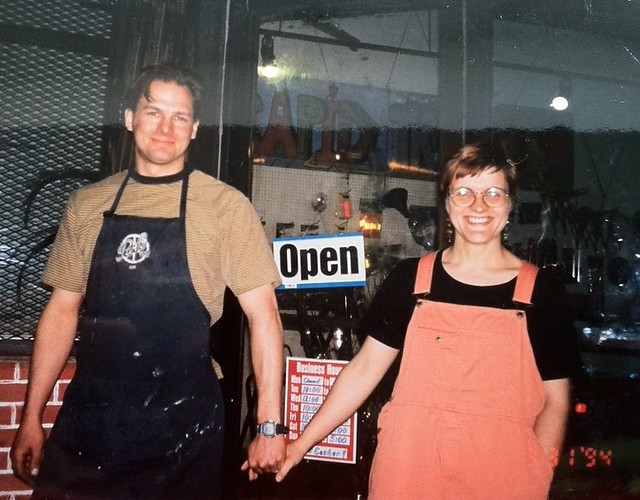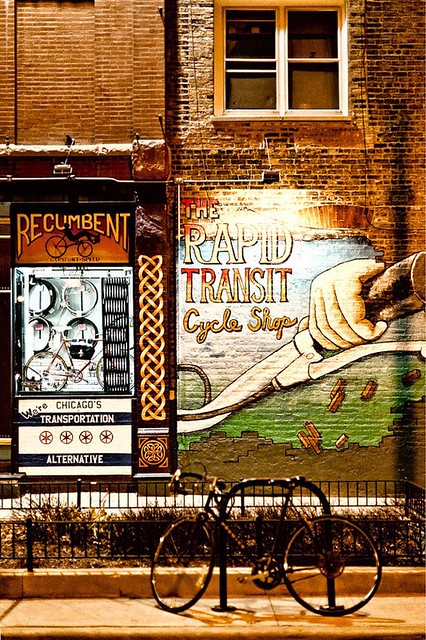It’s the end of an era. After 21 years, the store that helped launch Chicago’s transportation cycling revolution is calling it a day.
Rapid Transit Cycle Shop, with locations in Wicker Park and University Village, announced yesterday that they will be closing soon. “Since 2008, we’ve been affected by the downturn in the economy, and we don’t have enough cash on hand to get us through the winter,” said Chris Stodder, who owns the shop with his wife Justyna Frank. “We made this decision after we weren’t able to reach an agreement with our landlords. It was a double-whammy of soft sales this year and an inability to access new capital through loans.”
Back in 1994, when bike commuting was relatively uncommon in Chicago, and the city had few bike lanes or parking racks, Stodder and Frank had the novel idea of opening a shop that focused on everyday cyclists, rather than Lycra-clad racers and hobbyists. From their storefront at 1900 West North in Wicker Park, they sold bicycles that were hard to find at the time, including European-style city bikes, cargo cycles, recumbents, folding bikes and more. 15 years later, they opened a satellite shop at 1344 South Halsted, near the University of Illinois at Chicago.
“Cycling is obviously exploding in Chicago, and we were doing tons of repairs this summer,” Stodder said. “But we weren’t selling enough big-ticket items to keep ahead of our overhead. Sales reps have told us that there has been a decline in wholesale business across the Midwest recently, but bike shops keep opening here, so it may be a case of more stores splitting a smaller pie.”
To cut costs, Rapid Transit reduced their staff and moved to a smaller space on Halsted last year, but Stodder says it wasn’t enough to stop the financial bleeding. They plan to close both stores within the next 60 days, after they’ve had a chance to finish all pending repairs, take care of special orders and layaways, and empty out both spaces.
I asked Stodder what accomplishments he’s most proud of from the last two decades. “It’s a weekly occurrence, but we change people’s lives,” he said. “We always encouraged people to ride no matter what their current physical shape or abilities were. We’ve turned people into cyclists when they weren’t before.”
He says many people have told them that getting into cycling has made their commute to work more enjoyable, helped them lose weight, or even given them a new outlook on life. “Those testimonies have helped us keep going when times got hard."
Stodder added than employees have met their spouses while working at the shop, and working at the store has served as a springboard to careers in the bike industry, bike advocacy, and urban planning for many former workers. Rapid Transit has also served as an incubator for newer, like-minded shops such as Boulevard Bikes in Logan Square (where I once worked), Blue City Cycles in Bridgeport, Comrade Cycles in Ukrainian Village, and Green Machine Cycles in Uptown, plus the mobile repair business Pedal to the People. All of these businesses are owned by ex-employees.
Many former staff members and customers posted tributes on Rapid Transit’s Facebook page upon hearing the news. “There isn't a day that goes by that I don't recall something I learned from you guys,” wrote Boulevard owner Kevin Womac. “Thanks for the influence – love you guys,” posted Pedal to the People’s Adam Clark.” In an earlier interview, Blue City co-owner Owen Lloyd told me, “A lot of the mentoring I’ve gotten has been from folks like Chris Stodder and Justyna Frank at Rapid Transit, just seeing how they run their shop.”
The silver lining of this sad news is that Stodder and Frank may not be out of the bike business for good. “We’ve already got a business plan half written in our heads,” said Stodder. “That’s a tall order right now because we’re so beat down by this experience, but we would like to land on our feet."
He wouldn’t go into details, but said the new endeavor would likely be a brick-and-mortar store that also facilitated Internet sales for customers, specializing in Rapid Transit’s niche areas like cargo bikes, folders and recumbents. While he said he’d like to shift the focus of the business from repairs to retail, he added, “I think there will always be a repair component of what we do.”
“Despite the extremely difficult situation for Justyna and myself, there’s been an outpouring of support from the community,” Stoddard said. “We’ve got some fantastic customers.”
Here’s hoping that the closure of Rapid Transit is only a temporary hiatus in Stodder and Frank’s efforts to help more Chicagoans reap the benefits of biking.







